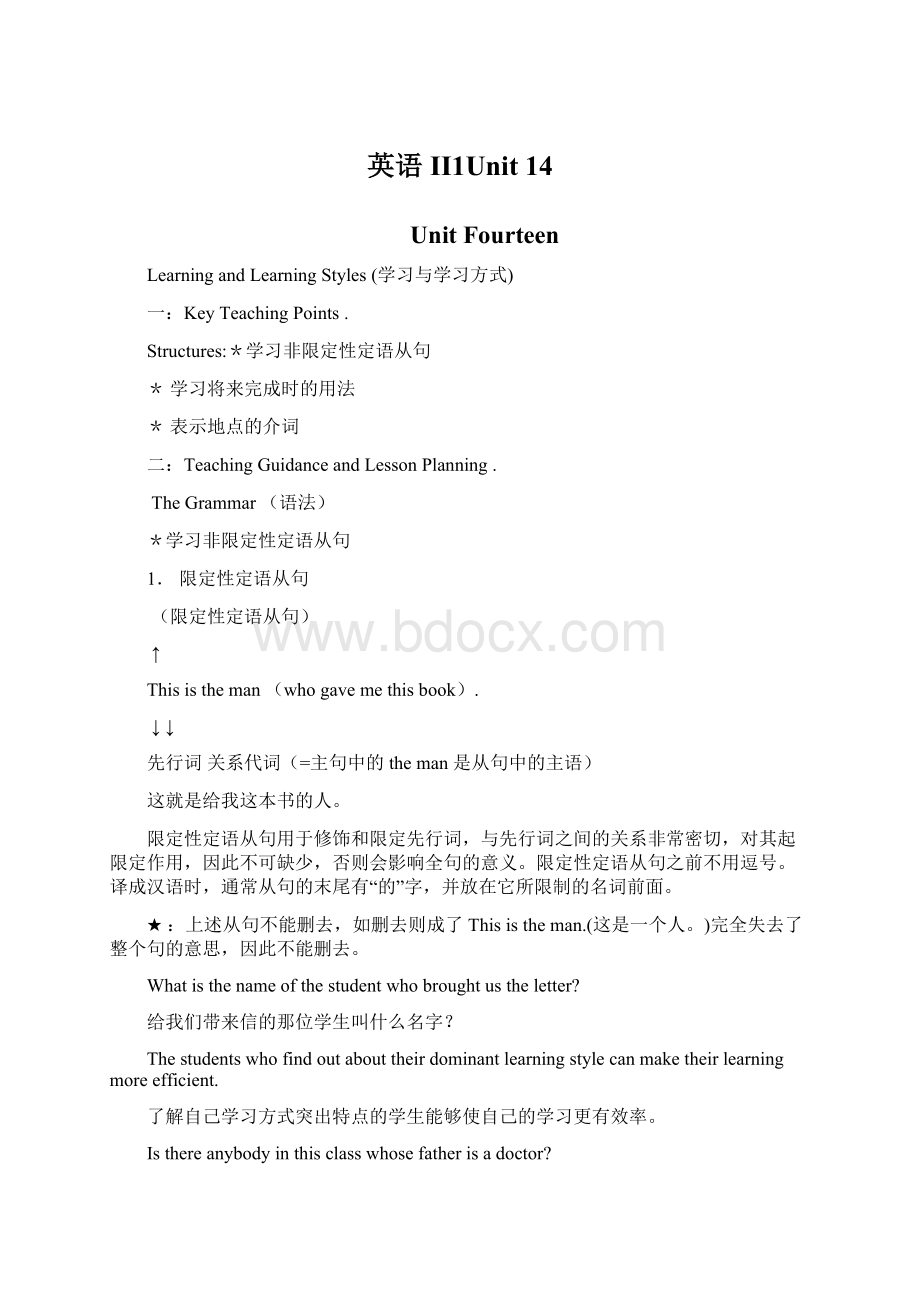英语II1Unit 14.docx
《英语II1Unit 14.docx》由会员分享,可在线阅读,更多相关《英语II1Unit 14.docx(7页珍藏版)》请在冰豆网上搜索。

英语II1Unit14
UnitFourteen
LearningandLearningStyles(学习与学习方式)
一:
KeyTeachingPoints.
Structures:
*学习非限定性定语从句
*学习将来完成时的用法
*表示地点的介词
二:
TeachingGuidanceandLessonPlanning.
TheGrammar(语法)
*学习非限定性定语从句
1.限定性定语从句
(限定性定语从句)
↑
Thisistheman(whogavemethisbook).
↓↓
先行词关系代词(=主句中的theman是从句中的主语)
这就是给我这本书的人。
限定性定语从句用于修饰和限定先行词,与先行词之间的关系非常密切,对其起限定作用,因此不可缺少,否则会影响全句的意义。
限定性定语从句之前不用逗号。
译成汉语时,通常从句的末尾有“的”字,并放在它所限制的名词前面。
★:
上述从句不能删去,如删去则成了Thisistheman.(这是一个人。
)完全失去了整个句的意思,因此不能删去。
Whatisthenameofthestudentwhobroughtustheletter?
给我们带来信的那位学生叫什么名字?
Thestudentswhofindoutabouttheirdominantlearningstylecanmaketheirlearningmoreefficient.
了解自己学习方式突出特点的学生能够使自己的学习更有效率。
Isthereanybodyinthisclasswhosefatherisadoctor?
关系代词/关系副词
先行词是人:
who/whom/whose
Theboy(who)isstandingthereismybrother.
IwillgiveapresenttothosewhocometoclassnextSunday.
Thepersonwhomyouwrotealettertohascometovisityou.
Thisisthestudentwhosefatherisadoctor.
先行词是物:
that/which
关系副词:
why,where,…
Thisistheroomhewasborn.
●where,inwhich
2.非限定性定语从句
先行词,非限定性定语从句
↑↑
LiMing,whoisintheroom,wantstoaskyousomequestions.
李明在屋子里,他想问你几个问题。
在意义上它是先行词的一个附加修饰语,与先行词之间的关系松散,不能对其起限定作用,对先行词只起进一步说明的作用,有时对主句做进一步说明,如果删掉它,不影响整个句子的基本意思,因此通常用逗号把它和其它句子分开,句中的关系代词不能省略。
译成汉语时,一般用并列句表达,或单独译成一句话。
★上述主句是LiMingwantstoaskyousomequestions.
定语从句为whoisintheroom.如删去从句则不影响句子的基本意思。
Manyeducators,whoresearchinthisfield,saythateverybodyhasoneofthreebasicwaystoprocesstheworld:
visual,auditoryorkinaesthetic.
很多教育工作者在此领域进行研究探讨,他们认为,每个人处理外部世界信息的方式不外乎以下三种:
视觉型、听觉型或动觉型。
Thecoursebooks,whichmycolleaguesfoundveryinteresting,wereuselessforme.
这些教科书对我没用,我的同事却觉得非常有趣。
★限定性定语从句和非限定性定语从句的区别
限定性
非限定性
与先行词之间的关系非常密切(删掉后影响全句的意义)
与先行词之间的关系不密切(是一种补充说明,删掉后不影响整个句子的基本意思。
)
不用逗号分开
通常用逗号分开
可用关系代词that
不可用关系代词that
可以省略(that,who,which在从句中担任宾语时可以省略)
不可以省略
可以替代(whom担任宾语时可用who或that替代)
不可以替代
读时不停顿
读时停顿,用降调
只可以修饰先行词,不可以修饰主句或主句的一部分。
修饰整个主句或主句的一部分,此时定有逗号分开,只能由which或as引导。
Hehelpedmealot,whichIwillalwaysremember.
Heboughtahouse,whichcosthimalotofmoney.
★限定性定语从句
IntheirclasstherearefifteenstudentswhocanspeakEnglishwell.
在他们班上有十五位英语说得好的学生。
(可以看出他们班上不只十五位学生,要多于十五位{morethanfifteenstudents})。
★非限定性定语从句
Intheirclasstherearefifteenstudents,whocanspeakEnglishwell.
在他们班上,有十五位学生,他们英语都说得很好。
(从句子中可以看出他们班上有十五位学生,这十五位学生英语口语都好。
{Therearefifteenstudentsintheirclass.})
★限定性定语从句
ShehastwosonswhoareP.L.A.men.
(MaybeshehasothersonswhoarenotP.L.Amen.)
她有两个当解放军的儿子。
(她有不止两个儿子,其余的可能不当兵。
)
★非限定性定语从句
Shehastwosons,whoareP.L.A.men.
(Shehasonlytwosons.TheyarebothP.L.A.men.)
她有两个儿子,他们都是解放军。
(她只有两个儿子,他们都是解放军。
)
Activity3
1.ThePersonwhotalkswhilehe/shereadsisanauditorylearner.
2.Thepersonwholikessketchesisavisuallearner.
3.Thepersonwhowriteseverythingdownisakinaestheticlearner.
4.Thepersonwhotouchesthingsisakinaestheticlearner.
5.Thepersonwhorememberssoundsisanauditorylearner.
6.Thepersonwhousesdiagramsisavisuallearner.
7.Thepersonwhoeasilyrecallscoloursisavisuallearner.
8.Thepersonwhomovesalotwhilelearningisakinaestheticlearner.
9.Thepersonwhoremembersnamesisanauditorylearner.
10.Thepersonwhoremembershapesisanvisuallearner.
Activity5
1.Thesandwichcourse,whichIhavebeenonforaweek,isreallyexcellent.
2.Igotoanon-the-jobtrainingcourse,whichtakesonedayaweek.
3.Thejobprospectsinengineering,whichusedtobegood,aredecliningnow.
4.Theinterview,whichhehadyesterday,wentverywellindeed.
5.Accountancy,whichhehasdecidedtogoinfor,paysveryhighsalaries.
6.Acoursewiththatcompany,whichyoucouldbeginatanytime,wouldbeaverygoodideaforyou.
*学习将来完成时的用法
TheFuturePerfectTense(将来完成时)
(1)将来完成时的形式:
肯定式:
主语+will(shall)have+过去分词
否定式:
主语+willnot(won’t)have+过去分词
疑问式:
Will+主语+have+过去分词
Bytheendofthecourseyouwillhavegainedthreecredits.
学完本课程,你将获得三个学分。
Youwon’thaveearnedourcertificatebyDecember.
到12月份你还不能获得我处颁发的证书。
Bynextyear,wewillhaveputupthreenewhospitals.
Nextyear,wewillputupthreenewhospitals.
WillyouhavemethimbeforeyouseemeonFriday?
在星期五你见到我之前你会已经跟他会过面吗?
WilltheyhaveboughtallthecomputersbeforetheyappointanewDirectorofStudies?
在任命新的教务主管之前,他们会已经买到所有计算机了吗?
注意:
在用before或after引导的表示将来的时间状语从句中,动词需用一般现在时,而不用一般将来时。
(2)将来完成时的用法:
将来完成时用来表示到将来某一时刻前已经完成的动作或事情,并往往对此后产生影响,它常与表示将来的时间状语连用。
在肯定句中,表示将来的时间短语位置灵活,可置于句首,也可置于句尾,而在否定句和疑问句中则置于句尾。
eg:
Whenwegetthere,they’llprobablyhaveleft.
Tom’sfootballmatchendsat4.15.Soat4.30thematchwillhavefinished.
Thetaxiwillhavearrivedbythetimeyoufinishdressing.
Bythetimeyoucompletethecourse,youwillhaveearnedaDirectCertificate.
OR:
YouwillhaveearnedaDirectCertificatebythetimeyoucompletethecourse.
在完成所有“通达”课程后,你将能获得“通达”合格证书。
Bytheendofnextyearwewillhavesetupafullrangeofcomputingfacilities.
OR:
Wewillhavesetupafullrangeofcomputingfacilitiesbytheendofnextyear.
到明年年底,我们将建立起全套完备的计算机设备。
■:
将来完成时从将来的角度看已经过去,即表示在将来某一时间之前已经完成的动作。
常与by+时间名词连用,也常与表示完成意义的动词(如build,complete,finish等)连用。
eg:
I’llhaveretiredbytheyear2019.
WeshallhavefinishedtheworkbeforenextFriday.
在believe,expect,hope,suppose等动词后也常用将来完成时。
eg:
Iexpectyouwillhavechangedyourmindbytomorrow.
Wehopeyou’llhavegottheinstructionsreadybeforewecometomorrow.
Activity12
1.BytheendofJulythebuildingcommitteewillhaveapprovedtheplans.
2.BytheendofJulythefinancecommitteewillhaveapprovedthebudget./ThefinancecommitteewillhaveapprovedthebudgetbytheendofJuly.
3.ThenewDirectorwillnothave/won’thavestartedhisjobbytheendofJuly.
4.BytheendofDecembertheDirectorwillhaveappointedthe/aDirectorofStudies./TheDirectorwillhaveappointedthe/aDirectorofStudiesbytheendofDecember.
5.BytheendofJunenextyearthecentrewillhaveboughtcomputers./ThecentrewillhaveboughtcomputersbytheendofJunenextyear.
6.Thetechnicianswillnothave/won’thaveinstalledthecomputersbytheendofJunenextyear.
7.BytheendofJunenextyeartheDirectorwillhaveappointednewtrainers./TheDirectorwillhaveappointednewtrainersbytheendofJunenextyear.
8.BytheendofJanuarytheyearafternext,thecentrewillhavebeenlaunched./ThecentrewillhavebeenlaunchedbytheendofJanuarytheyearafternext.
Activity13
1.Willtheyhaveinstalledthenewcomputersbeforetheylaunchthecentre?
2.WilltheDirectorhaveappointednewtrainersbeforetheyinstallthenewcomputers?
3.WillthenewDirectorhavestartedworkbytheendofthisyear?
4.Willtheyhaveinstalledthenewcomputersbytheendofthisyear?
5.WillthefinancecommitteehaveapprovedthebudgetbytheendofJuly?
6.Willthebuildershaveconvertedthecentrebeforeitbuysnewcomputers?
*表示地点的介词;
介词与其后面的名词、代词或相当于名词的其它词类、短语等组成介词短语,用于表示地点、时间、方式方法、原因、伴随情况、目的等。
介词后面的名词称作介词宾语。
当介词宾语为人称代词时,要用其宾格形式。
in在…中,在…地方inthebox,inEngland
as在…地方,在…旁atschool,atthedoor,athome
on在…上onthefirstfloor,onthetrain
by在…旁bythewindow,bythedesk
beside在…旁besidetheoldman,besidetheroad
under在…下面underatree
over在…上方overthetable
above在…上方abovetheblackboard,abovethehouse
up向…上upthestairs,upatree
down向…下downthestairs,downthehill
near在…附近neartheshop,nearmyhome
between在…(两者)之间
betweenthetwowindows,betweenthetwobuildings
outside在…外面outsidethestation
inside在…里insidemypocket,insidethehouse
behind在…后面behindthedoor,behindthewoman
*介词是虚词,不能单独用作句子的成分。
介词短语常在句中用作状语、定语或表语。
Therearetwochineserestaurantsonthethirdfloor.(状语)
Thepenonthedeskismine.(定语)
TheyarefromBeijing.(表语)